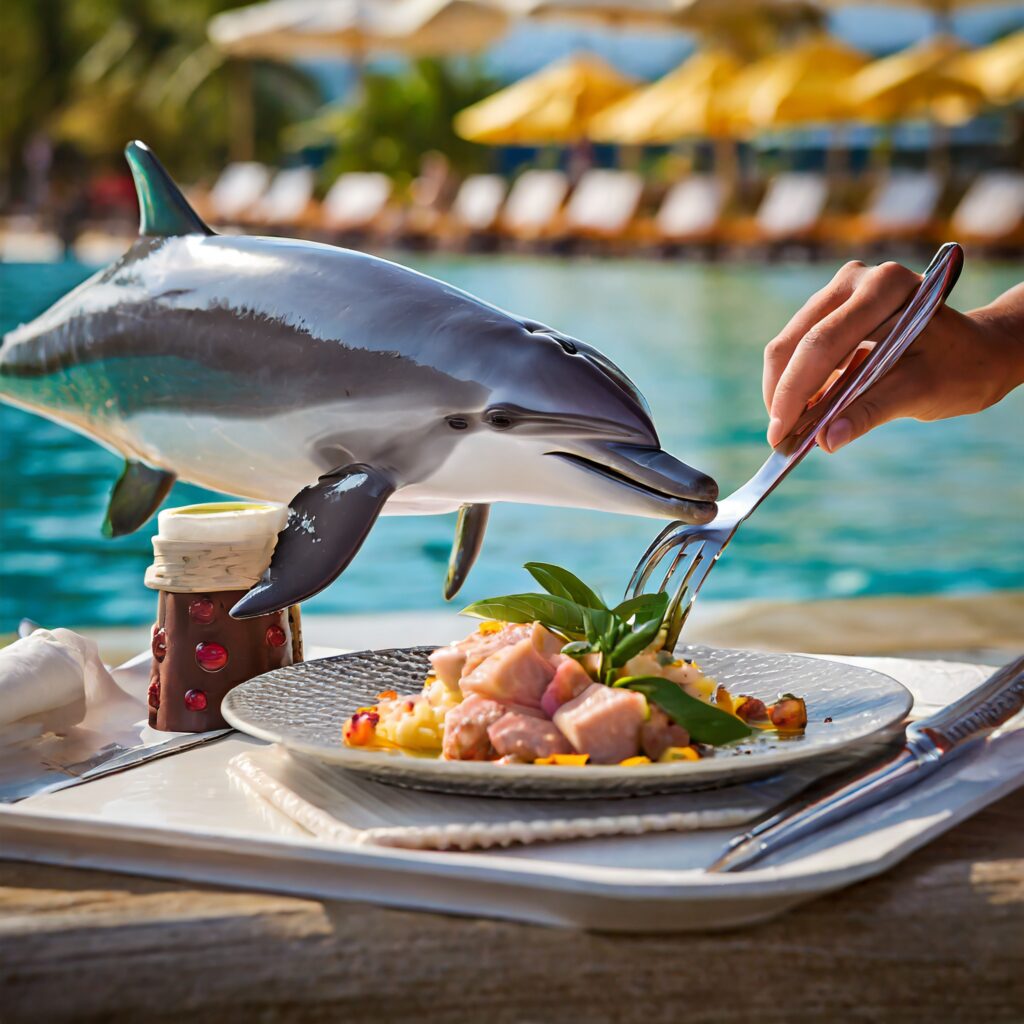
Do Humans Eat Dolphins? No, humans do not commonly eat dolphins. Dolphins are not a typical source of food for humans because of their intelligence and conservation status.
Although dolphin hunting for meat may occur occasionally in some cultures, it is not a popular or widespread activity in the world’s food industry.
Since dolphins are admired for their ecological contributions as well as for being socially conscious and intellectual animals, eating their meat is looked down upon in many cultures.
Due to their intricate social systems and some striking similarities to humans, dolphins are typically seen to be more suited for ecotourism and conservation initiatives than for use as food.
Global initiatives to safeguard dolphins from overexploitation and to encourage their conservation in maritime environments have been sparked by this awareness.
Table of Contents
The Fascinating History Of Dolphin Consumption
Since dolphin meat is consumed in many countries and customs, humans and dolphins have had a complicated connection throughout history.
The eating of dolphins is an old tradition that still sparks controversy and strong feelings worldwide. It originated in ancient times.
See Also: Why Is Dolphin Meat Black? Is It Safe To Eat Dolphin Meat?
Ancient Cultural Practices
Dolphins were hunted and eaten throughout history by a number of ancient cultures, especially those that lived by the shore, as a source of food and other resources.
Dolphins were considered holy in certain cultures and, because of their abundance around the coast, were an essential component of the diet in others.
For example, dolphins were portrayed in Greek and Roman mythology and art, illustrating the complicated relationship ancient societies had with these sea mammals. [Do Humans Eat Dolphins?]
Contemporary Global Attitudes Towards Dolphins As Food
The views on eating dolphins have changed dramatically in the current era.
The practice of hunting and eating dolphins is still practiced by some isolated populations in nations such as Indonesia, Japan, and some Caribbean regions as a means of livelihood.
However, the general public’s opinion of dolphin meat consumption has shifted significantly towards controversy and objection.
In many regions of the world, there is a consensus opposing the consumption of dolphins due to the representation of these marine mammals as charismatic and intelligent beings, as well as extensive conservation efforts.
See Also: Can You Eat Dolphin in America? The Surprising Truth
Conservation And Ethical Concerns Around Dolphin Consumption
Dolphins are intelligent animals that are a part of marine ecosystems, so eating them presents ethical and conservation issues.
Although this practice is observed in some cultures, efforts are being made worldwide to increase public awareness of the harm that dolphin consumption does to both the environment and dolphin populations. [Do Humans Eat Dolphins?]
The Impact On Dolphin Populations
Dolphin consumption can have detrimental effects on dolphin populations.
Dolphins are sociable and highly intelligent animals that are especially vulnerable to overexploitation for human consumption due to their modest reproductive rates.
Dolphin populations may dwindle and marine ecosystems may be disrupted as a result of unsustainable hunting methods brought on by the demand for dolphin meat and other items. [Do Humans Eat Dolphins?]
Preserving the equilibrium of marine life requires the protection of dolphins.
Environmental And Moral Implications Of Eating Dolphins
There are significant ethical and environmental issues with eating dolphins. As apex predators, dolphins are essential to preserving the equilibrium of aquatic environments.
Eating them may cause food chain imbalances and might have negative effects on other marine animals. Moreover, dolphins’ high intelligence, social behaviors, and complex emotional lives raise ethical questions about eating them.
The ethical treatment of sentient animals and our moral obligation to protect them are called into question by the ingestion of dolphins. [Do Humans Eat Dolphins?]
See Also: Is Dolphin Meat Edible? Is Dolphin Meat Bad For Health?
The Edible Qualities Of Dolphins
Though they are adored and extremely clever aquatic creatures, do people actually eat dolphins? Let’s explore the edible aspects of dolphins, such as their nutritional worth and any possible health hazards from consuming them.
Nutritional Value
Although dolphin flesh is prized in some cultures, it’s vital to remember that it’s high in protein and minerals like phosphorus, potassium, and iron.
But the meat also has a lot of mercury in it, and too much of it can be harmful to your health.

Health Risks Associated With Dolphin Consumption
Eating dolphin meat exposes people to methylmercury, a strong neurotoxin that can have negative consequences on health, especially the nervous system.
Dolphin intake may also carry additional health hazards due to the accumulation of various environmental pollutants in their bodies. [Do Humans Eat Dolphins?]
| Nutrient | Amount per 100g |
| Protein | 22g |
| Iron | 3mg |
| Potassium | 400mg |
| Phosphorus | 250mg |
Legal Regulations And Bans On Dolphin Hunting
The controversial topic of eating dolphins is surrounded by laws, prohibitions, and cultural sensitivities.
Dolphin conservation is greatly influenced by national policies on the use of dolphins for food, as well as by international rules and regulations.
International Rules and Laws
A number of international organizations have established restrictions that forbid the killing and eating of dolphins.
Since 1986, the International Whaling Commission (IWC) has prohibited the hunting of big whales, including porpoises and dolphins.
Furthermore, the trade of animals that are at risk of going extinct is regulated and restricted by the Convention on International Trade in Endangered Animals of Wild Fauna and Flora (CITES), which includes some species of dolphins. [Do Humans Eat Dolphins?]
See Also: Can You Eat Bottlenose Dolphin? From Taboo to Table
Countries Permitting And Prohibiting Dolphin Consumption
Japan’s long-standing custom of eating dolphin meat has put it at the epicenter of controversy.
Although the annual dolphin hunt at Taiji, where dolphins are abducted for their meat or sold to marine parks, is not illegal in Japan, there is growing international condemnation of the practice.
On the other hand, hunting or eating dolphins is prohibited in the US, Australia, and the EU due to strict laws and prohibitions.
India has joined the group of nations that forbid the eating of dolphins and has outlawed the taking of dolphins and their death within its territorial waters.
Dolphin consumption is allowed in the Solomon Islands, the Faroe Islands, and other Caribbean and West African countries, frequently as part of customary practices. [Do Humans Eat Dolphins?]
Substitutes For Eating Dolphins
It’s important to look at sustainable and culturally acceptable alternatives when thinking about dolphin consumption.
Ethical questions have been raised by the consumption of dolphin flesh, however, there are other possibilities to take into account. [Do Humans Eat Dolphins?]
Sustainable Seafood Choices
Selecting sustainable seafood options is one practical strategy to stop eating dolphin meat.
Prioritizing sustainably produced fish can both satisfy gastronomic cravings and contribute to the preservation of marine biodiversity. Consider the following sustainable seafood options:
- Wild-caught Alaskan salmon
- Organic farmed mussels and clams
- Pacific halibut from responsible fisheries
See Also: Are Dolphins Safe To Eat? The Truth About Consuming Dolphins
Cultural And Culinary Alternatives To Dolphin Meat
Accepting cultural and gastronomic alternatives is another method to avoid eating dolphins.
To find delicious and morally responsible solutions, means investigating many cuisines and cultures. Consider the following gastronomic and cultural alternatives:
- Fresh and nutritious vegetarian and vegan dishes
- Traditional Japanese and Mediterranean seafood recipes
- Artisanal plant-based seafood substitutes
Frequently Asked Questions Of Do Humans Eat Dolphins?
Do Humans Eat Dolphins?
Humans do not frequently eat dolphins. Although dolphin hunting and consumption have occurred in some societies, it is not a common practice and is controversial because of environmental issues.
Are Dolphins Safe To Eat?
Because dolphin meat contains high levels of mercury and other contaminants, consuming it can be harmful to your health. Eating dolphin meat is advised to be avoided in order to avoid any potential health risks.
What Does Dolphin Meat Taste Like?
Like other marine mammals, dolphin flesh is said to have a rich, gamey flavor. However, the type of dolphin and the cooking technique can affect the flavor.
Conclusion
Even if dolphins are eaten in some regions of the world, it’s crucial to think about the moral ramifications of this practice.
We can work to safeguard these sentient animals and advance sustainable fishing methods with greater awareness and education.
In this continuing dialogue, it is essential to comprehend the cultural and environmental elements at work.

Mr. Das, a certified pharmaceutical scientist, holds a Bachelor of Science in Pharmaceutical Sciences and passionately contributes to dolphin conservation as a member of the committee in Bangladesh.


